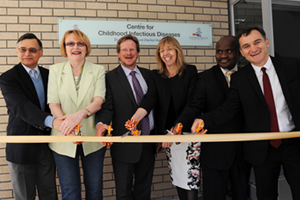New centre tackles children's infectious disease head-on
17 October 2013 | Story by Newsroom Pioneering: The new Centre for Childhood Infectious Diseases and the Research Centre for Adolescent Health was launched at the Red Cross War Memorial Children's Hospital yesterday. Cutting the ribbon were (from left) Prof Brian Eley, premier Helen Zille, provincial health minister Theuns Botha, Prof Heather Zar, Dr Matodzi Mukosi (the hospital's new chief executive officer), and Spencer McNally (chair of the Children's Hospital Trust).
Pioneering: The new Centre for Childhood Infectious Diseases and the Research Centre for Adolescent Health was launched at the Red Cross War Memorial Children's Hospital yesterday. Cutting the ribbon were (from left) Prof Brian Eley, premier Helen Zille, provincial health minister Theuns Botha, Prof Heather Zar, Dr Matodzi Mukosi (the hospital's new chief executive officer), and Spencer McNally (chair of the Children's Hospital Trust).
Infectious diseases account for more than 65% of all under-five mortality in the country, statistics the province's newly launched Centre for Childhood Infectious Diseases and the Research Centre for Adolescent Health will tackle head-on.
Attached to the flagship Red Cross War Memorial Children's Hospital, the airy new centre is the first paediatric clinical research centre in a South African (and African) children's hospital, clustering research and clinical practice under one roof.
At a cost of just under R21 million, it was built with funds raised by the Children's Hospital Trust.
Speaking at yesterday's launch, head of the hospital's Paediatric Infectious Diseases Unit, Professor Brian Eley, described it as a milestone in both patient care and sub-specialist training.
"The dedicated space will allow the unit to expand its outpatient clinical service, increase support for children with drug-resistant HIV infection and complicated tuberculosis, and conduct on-site training for health professionals from level-1 clinics.
"Fulfilling these clinical responsibilities, the centre will support to the province's entire network of primary and secondary level facilities managing children with infectious diseases."
Sub-specialist training
Importantly, the centre will train the country's next generation of paediatric infectious disease sub-specialists.
"We trained the first three paediatric infectious diseases sub-specialists to qualify in South Africa and the most of any South African training unit thus far," Eley added.
The unit has begun training the first non-South African paediatrician, a Nigerian national.
"We hope to make a sizeable contribution towards training paediatric infectious diseases leaders for our continent in the next few years," Eley said.
Growing care and support
The new centre has its roots in the hospital's HIV clinic, established by Dr John Burgess and Professor Gregory Hussey in the 1990s.
Over the years this was transformed into a comprehensive, tertiary-level infectious diseases service, caring for children with complex or advanced infectious diseases - including severe HIV infection, drug-resistant tuberculosis and hospital-acquired infections ― and children with underlying primary immunodeficiencies and unusual infections, Eley said.
Addressing the importance of the research that underpins health care, head of the Department of Paediatrics and Child Health and director of the School of Child and Adolescent Health at UCT and the Red Cross, Professor Heather Zar said there was an inextricable link between excellent clinical care and research, particularly in developing nations.
"This centre will provide a world-class facility to enable clinical research in the most pressing issues in child health," she added. "Such research can improve the health of children in South Africa, in Africa, and globally."
Brand built on partnership
Speaking at the red-letter event, premier Helen Zille described the Red Cross as her "favourite place to visit" and lauded the goodwill and commitment was evident among staff '“ and the importance of partnerships.
"Red Cross symbolises what we means by the 'better together' brand. In health and education we have the most powers under the Constitution to build an enterprise in partnerships."
Provincial health minister Theuns Botha added: "We're excited about how many lives this centre will affect."
Fact box
- Globally, pneumonia is the main cause of death in children under five years. The global burden of severe cases is highest in Africa and Southeast Asia, which account for 30% and 39% of cases.
- In 2010 there were some 15 million hospitalisations for severe lower respiratory tract infections in children globally, while 99% of deaths were in low- or middle-income countries.
- 50 000 new TB cases were reported in the province in 2010 ― an incidence rate of 885 per 100 000
- World Health Organisation stats show that 10% of all TB cases occur in children, implying that there is a sizeable number of children with TB in the Cape Metro district, home to about 70% of the Western Cape's population.
- The hospital manages around 260 000 patient visits annually and one-third of the hospital's patients is younger than one year.
Story by Helen Swingler. Image by Michael Hammond.
 This work is licensed under a Creative Commons Attribution-NoDerivatives 4.0 International License.
This work is licensed under a Creative Commons Attribution-NoDerivatives 4.0 International License.
Please view the republishing articles page for more information.










